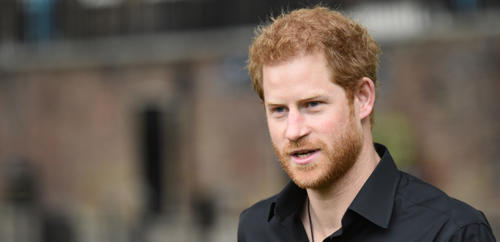- 27 March 2025
![]()
Daniel Valentine, Head of Communications, Chartered Governance Institute UK & Ireland

The Duke of Sussex vowed never to walk away from Sentebale, the charity he created in 2006, at the age of 21, in memory of his late mother, Diana, Princess of Wales, but this week he resigned as a Patron, following a breakdown in boardroom relations during which all trustees but one resigned. The incident has generated significant press coverage, which was fed by a number of public statements made by the different parties to the dispute.
What is Sentebale?
Following his first visit to Lesotho during his gap year in 2004. Prince Harry decided to help the children he had met whose lives had been affected by HIV/AIDS. Together with Prince Seeiso, the younger brother of King Letsie III of Lesotho, Prince Harry set up Sentebale in 2006. (The word Sentebale means ‘forget-me-not’ in Sesotho, the official language of Lesotho.)
Sentebale was formally registered as a UK Charity on 17th March 2006. Working in partnership with local organisations, Sentebale was founded to help children in Lesotho who have become victims of extreme poverty or HIV/AIDS.
Over time the charity increased its scope and geographical coverage. On 27th November 2016, Sentebale launched the first of three weeks of camp in Botswana, providing support to 150 young people. Prince Harry spoke of his passion for the future of the charity’s work as it planned to expand into five sub-Saharan African countries by 2020, delivering psychosocial support to 10 to 19-year-olds who are struggling to come to terms with living with HIV.
Sentebale’s HQ is a serviced office in central London. and celebrated its nineteenth birthday last week. The charity’s income fluctuates considerably from year to year, but its last published accounts showed an annual income of £3.4m and 107 employees.
In July 2023, the Chair of Sentebale, Johnny Hornby, stepped down after serving 11 years on Sentebale’s Board including a five-year term as Chair since March 2018 and Sophie Chandauka was appointed as Chair. She was not an unknown quantity as she had served on the Sentebale Board from 2009-2015. Born in Zimbabwe, she won scholarships to study in the UK, the USA and Canada. She qualified as a lawyer in London in 2005, working on corporate transactions and IPOs. In the 2021 Queen's birthday honours she was awarded an MBE "for services to Diversity in Business." She is also co-founder and chair of Nandi Life Sciences and founded the Black British Business Awards in 2014, an organisation which she still chairs, and also Chair and Executive Founder of The Network of Networks.
It is safe to say that Chandauka’s personal network is comparable with Prince Harry’s, and also safe to assume that her knowledge of UK charity law is better than most. On paper, Chandauka is surely an ideal chair.
What has happened recently at Sentebale?
Looking at the press releases which accompanied her appointment, Chandauka seems to have been given a mandate as incoming Chair to continue transforming the Charity from a UK-led organisation to a Southern African-led organisation (whilst still maintaining its status as a UK registered charity) a mandate she took seriously and pursued rigorously.
The other transformation strategy of the charity, from a prime focus on HIV/AIDS to a much broader programme of integrated support for children and young people had been completed under Chandauka’s predecessor, Johnny Hornby.
In April 2024, the media reported an awkward moment with the Duchess of Sussex at a polo event raising funds for Sentebale. In footage from April 2024, Meghan appeared to ask Dr Chandauka not to pose next to Harry as he celebrated the Royal Salute Polo Challenge in Wellington, Florida. Dr Chandauka, who was stood on the Duke's right, was asked twice by Meghan to move to her left side away from Harry, as he kept his arm around his wife.
Whether this incident was part of a growing divide between the chair and charity’s royal patrons is not clear. What is clear is that over 2024 a rift grew between trustees and patrons on one hand and the chair on the other.
In December 2024 the charity announced a “strategic shift to anchor leadership in Southern Africa”. The London-based CEO Richard Mille stepped down and handed over to Carmel Gaillard, the charity’s Country Director for Lesotho, in a newly created role of Interim Executive Director. Did the move from CEO to Interim Executive Director signal a downgrading of the role of the CEO, and an increase in the power of the chair? In retrospect this might have been a warning sign.
The details of the growing disagreements between the trustees and the chair have not (yet) emerged but what we know is that eventually the trustees were united that Chandauka should step down and appear to have confronted her with an ultimatum, using their resignation as a threat.
She stood firm, refused to resign and then initiated legal action using the UK courts to block the other trustees from formally removing her. Presenting herself as a “whistleblower”, she also reported the trustees to the UK Charity Commission.
The trustees attempted coup had spectacularly failed, and they felt they had no other option than to carry through with their threatened resignation. They said this was in the "best interest of the charity", as the charity could not take on the "legal and financial burden" of the lawsuit.
On Monday 24th, all five trustees (Timothy Boucher, Mark Dyer, Audrey Kgosidintsi, Kelello Lerotholi and Damian West) resigned, leaving Chandauka as the sole trustee. The following day, Prince Harry and Prince Seeiso also resigned as Patrons of the charity, in what looks like a co-ordinated gesture of protest.
The threat of resignation in retrospect was a serious blunder. Their mass resignation gave Chandauka complete control of the charity and allowed her to recreate the trustee board unilaterally. It also gave Chandauka complete control over the communications of the charity, control which could be used to present her own side to the charity’s supporters via social media.
This is precisely what Chandauka did. The following day, Tuesday 25th, she promptly appointed four new trustees of her own choosing: Dr Bhakti Hansoti, Dr Margaret Ikpoh, Nerissa Naidu, David Ian Rawlinson. None of the four new trustees have any other trustee roles according to the Charity Commission website. The appointments were so rapid that it seems likely that this move was planned in advance.
Chandauka issued an extraordinary statement which said:
“I chose to join Sentebale first and foremost as a proud African who understands that — in the spirit of Ubuntu [interconnectedness] — to whom much is given, much is expected.
“Everything I do at Sentebale is in pursuit of the integrity of the organisation, its mission, and the young people we serve. My actions are guided by the principles of fairness and equitable treatment for all, regardless of social status or financial means.
“There are people in this world who behave as though they are above the law and mistreat people and then play the victim card and use the very press they disdain to harm people who have the courage to challenge their conduct.
“Discerning readers will ask themselves: why would the chair of the board report her own trustees to the Charity Commission? Why would the High Court of England and Wales accept her application to hear the matter at all if the case had no merit?
“Well, because beneath all the victim narrative and fiction that has been syndicated to press is the story of a woman who dared to blow the whistle about issues of poor governance, weak executive management, abuse of power, bullying, harassment, misogyny, misogynoir and the cover-up that ensued. I could be anyone.”
Meanwhile, Carmel Gaillard, Executive Director of Sentebale published a rather more neutral message on the Sentebale website:
“At any point of significant change in an organisation’s journey, conflict can arise. We acknowledge this openly and with a spirit of reflection and forward momentum.
“We are deeply grateful for the service, time, and passion of our outgoing Trustees. We are also saddened that our Co-Founding Patrons have made the decision to step down from their duties as Patrons for the foreseeable future. Their belief in our mission and early leadership helped shape the foundation of our work, and for that, we remain thankful. They will always be the Founders of Sentebale.
“Good governance is essential to the strength and credibility of any organisation. We are committed to upholding the highest standards and look forward to working with our incoming Trustees and our Chair to ensure this remains a core part of our operations.”
The Charity Commission also confirmed on Tuesday that an investigation was under way, but it is unclear what initiated this investigation, and what the terms of investigation are. A spokesman said: “We can confirm that we are aware of concerns about the governance of Sentebale. We are assessing the issues to determine the appropriate regulatory steps.”
Siding with the departing trustees, the princes’ statement said:
“These trustees acted in the best interest of the charity in asking the chair to step down, while keeping the wellbeing of staff in mind. In turn, she sued the charity to remain in this voluntary position, further underscoring the broken relationship. We thank all the trustees for their service over the years and are truly heartbroken they’ve had to follow through with this act.
“What’s transpired is unthinkable. We are in shock that we have to do this, but we have a continued responsibility to Sentebale’s beneficiaries, so we will be sharing all of our concerns with the Charity Commission as to how this came about.
“Although we may no longer be patrons, we will always be its founders, and we will never forget what this charity is capable of achieving when it is in the right care.”
Sentebale said that the charity had not received notice of the princes’ resignation. The charity added that the “recalibration” of the board was “part of Sentebale’s ambitious transformation agenda”.
The five former trustees released a statement describing their resignation as "devastating", and explained that it was the 'result of our loss in trust and confidence in the chair of the board':
'Our priority has always been, and will always be, what's in the best interest of the charity, and it's desperately sad the breakdown in relationship escalated to a lawsuit by the chair against the charity, to block us from voting her out after our request for her resignation was rejected.
'We could not in good conscience allow Sentebale to undertake that legal and financial burden and have been left with no other option but to vacate our positions. This was not a choice willingly made, but rather something we felt forced into in order to look after the charity.'
What happens now?
Will Sentebale struggle to fundraise after the loss of its Royal Patrons? Perhaps. The charity continues to benefit from its royal connection, using the names of Prince Harry and Prince Seeiso as founders. The charity presumably owns the copyright to all the photos taken of the founders taken over the last 20 years. If so, then they will carry on using them. Funding may suffer in the short-term but by the time donor contracts come up for renewal, this week’s debacle may be ancient history.
There are different ways of reading this story. Is it a tale of a courageous chair trying to professionalise and modernise a charity, bravely challenging a trustee board filled with cronies? Or is it a tale of a dominating and egotistical chair willing to create mayhem through complaints and legal actions to get her own way, irrespective of the consensus of the trustee board? Perhaps time will tell. Perhaps the full story will come out. Or perhaps it won’t. In a few weeks the current hiatus may be forgotten.
As Peter Swabey, Policy & Research Director of The Chartered Governance Institute UK & Ireland, commented:
“A public dispute like this will cause concern to both staff and donors and do harm to the charity sector at large. We await the conclusions from the Charity Commission’s investigation with interest.”
But the biggest impact of this governance crisis will be on the children who Sentebale serves. Sentebale means “forget me not.” Let’s hope in this current drama they are not forgotten.



